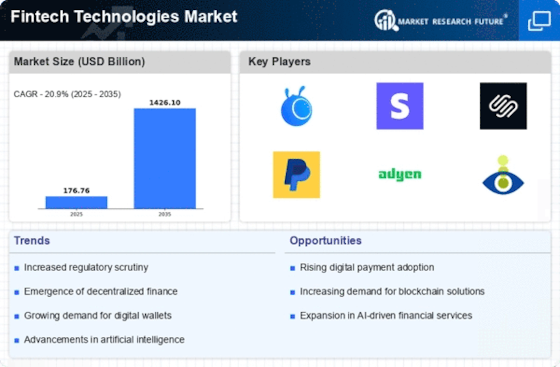Market Share
Fintech Technologies Market Share Analysis
Businesses employ a range of market share positioning tactics to identify their place in the ever-changing Fintech Technologies sector and stay ahead of their competition. They do this to stay ahead of the competition. Financial success often requires specialization. Because the industry is competitive. By focusing their resources and experience, financial technology businesses may provide customized solutions for consumers. Some companies excel in peer-to-peer lending, while others specialize in mobile payments. Either company might be profitable. By becoming market leaders, these companies want to increase their market share and build a reputation for high-quality products and services.
Another way to increase market share is to form and maintain strategic relationships. Financial technology companies typically partner with larger financial institutions to get access to their expertise and consumers. Startups in financial technology may expand their operations and access the huge customer bases of banks and insurance firms by forging strategic alliances. This is feasible via smart relationships. Fintech startups that partner with these institutions may be able to overcome customer trust and regulatory compliance, speeding market entry and industry growth. Because these institutions help these businesses overcome these first hurdles. These relationships help fintech businesses build their reputations and learn about customer preferences and industry trends.
To gain market share in financial technology, collaborations are essential. However, innovation and competitive technologies also matter. Companies that invest heavily in R&D and provide innovative goods and services usually have an edge. This gives them an edge over competition. Their distinctive goods and services set these enterprises apart in a competitive market. Smart solutions powered by AI, blockchain, and data analytics have set financial technology businesses apart from conventional banks. Some businesses stand out because of this. This category includes several software packages. Examples: robo-advisors, digital wallets, cryptocurrency platforms. In addition, the financial technology industry values customer-focused operations. To attract and keep customers, organizations that prioritize user experience, seamless interfaces, and personalized services are more likely to thrive. By meeting consumer needs and adjusting their offerings, financial technology firms may build customer loyalty. This gives companies a chance to build client loyalty. In this highly competitive industry, client retention is as vital as acquisition. A positive user experience generally leads to word-of-mouth marketing, which increases market share.
Finally, several financial technology companies are expanding internationally to increase market share. Technology allows organizations to conduct cross-border financial transactions, opening up new opportunities. As a consequence of this expansion, localized alliances, cultural awareness, and product modifications to meet regulatory standards are likely. This is feasible. Financial technology companies may tap into untapped revenue sources and become global players if they can overcome these challenges.


















Leave a Comment